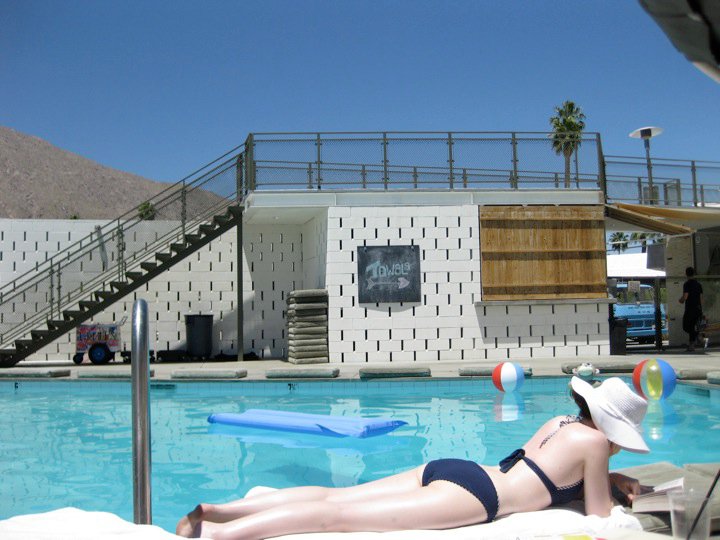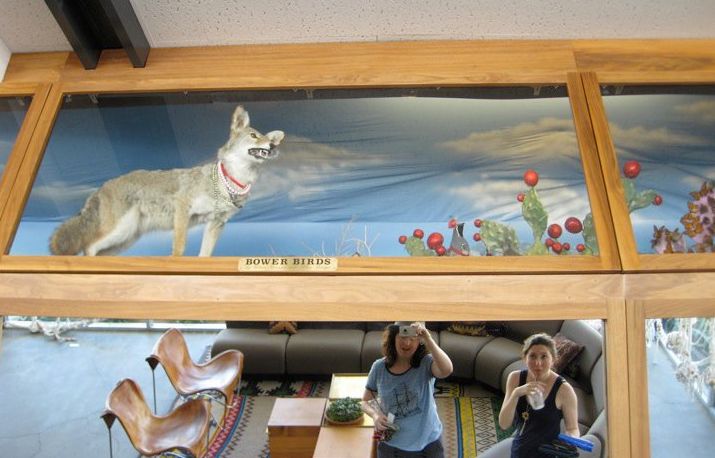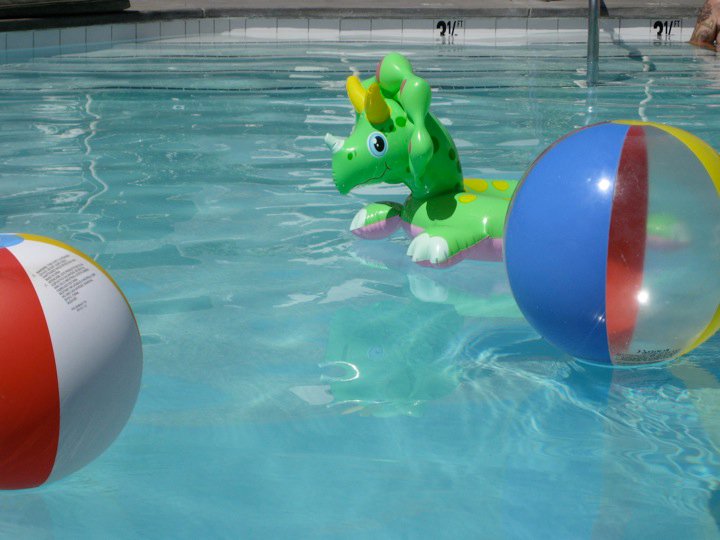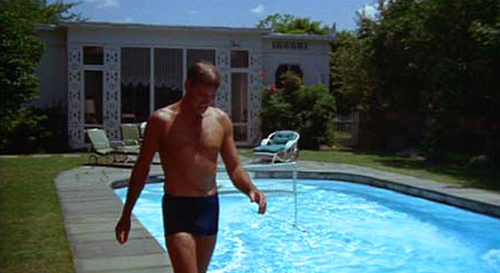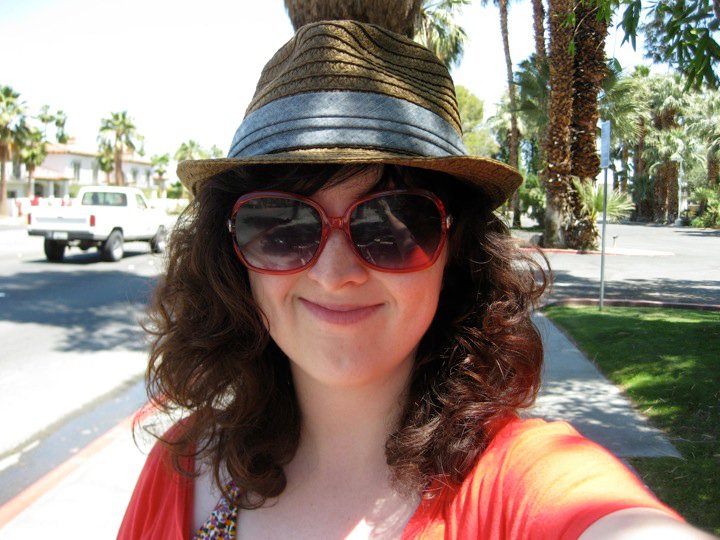 BOOKS
BOOKS In Which John Cheever Hits Rock Bottom
 Friday, February 4, 2011 at 11:24AM
Friday, February 4, 2011 at 11:24AM  burt lancaster in john cheever's 'The Swimmer'
burt lancaster in john cheever's 'The Swimmer'
John Cheever in Massachusetts
by ELISABETH DONNELLY
John Cheever was one of the few writers to get the cover of Time. In fact, he managed it twice in his lifetime, cementing his position as the "Ovid of Ossining," a monster short story writer chronicling suburban malaise at the moment the suburbs were invented.When he got it together to write the occasional novel, they were an event, from The Wapshot Chronicle to his late-in-life comeback Falconer.
Cheever's work and reputation was intertwined with his life as a self-styled country squire of Westchester; a man with a nice house, drinking with randy housewives, taking the Metro-North down to Manhattan when the time called for it. The Cheever mythology of vacations on Martha's Vineyard and suburban intrigue has left its influence as well, playing out in Mad Men, where Cheever serves as a spiritual father to Don Draper. (There are numerous Cheever references in the show — from Don and Betty Draper's house on Bullet Park Lane, to the shot of Draper in the pool, echoing Cheever's greatest story, "The Swimmer.") Really, what Cheever was about, according to the writer, was "a long lost world when the city of New York was still filled with a river light... and almost everybody wore a hat."

Yet, as Blake Bailey's epic door-stopper of a writer's biography, Cheever: A Life, meticulously details — counting every morning swig of alcohol — like all the best writers, Cheever was a faker. And in a life filled with feints and contradictions, the biggest fake of all was quite possibilty his New Yorker-bred reputation as a merciless New York chronicler. Regionalism is a slippery thing to characterize writers with these days, as anything beyond New York, California, "the South," or some prep school New England is nearly alien. But there's a streak of Massachusetts to Cheever's work, steeped, specifically, in Boston-area Irish Catholicism. It was the side of Cheever that he denied for his first seventeen years, and it blossomed in the central tension of most of his stories: class divides and the gulf between who you are and who you want to be.
According to the great Boston bard Henry Adams, Massachusetts residents are shaped by the weather: "winter and summer, then, were two hostile lives, and bred two separate natures." It's a state that prides itself on its liberalism, while also being filled with staid, conservative-of-mind Yankees who never chance, and who would never admit to anything like Californian self-help or New York neurosis. Cheever, born in Quincy, Massachusetts in 1912, was a prime example, and his divided sides fought their way into his work. He had a gimlet eye for the ways that people mess up in life, from the morose Lawrence of "Goodbye My Brother" or "The Swimmer's" poor Neddy, vigorously moving through chlorinated oblivion, and he turned these sad stories into something transcendent with his trademark humanistic scope.
 at home in Ossining, New York, 1979.Cheever presented his childhood in Quincy through rose-colored glasses, implying that he arrived in the world, fully formed as a man in his 17th year, where he dropped out from Thayer Academy while selling a short story called "Expelled" to The New Republic. (He claimed, of course, that he was en route to Harvard, yet Bailey notes that he was certainly not Harvard material as a student.) In a 1969 interview with The Paris Review, Cheever explained his aversion to his childhood: "If I looked over my shoulder I would die. I think frequently of Satchel Paige and his warning that you might see something gaining on you." And yet the events of Cheever's childhood, both traumatic and idyllic, certainly influenced The Wapshot Chronicle's family of eccentrics, be it his mother's embarrassing route from middle class austerity to the owner of a tchotcke shop, or his once-great shoe salesman father's fall into drink, and his confession that he thought John should've "never been born."
at home in Ossining, New York, 1979.Cheever presented his childhood in Quincy through rose-colored glasses, implying that he arrived in the world, fully formed as a man in his 17th year, where he dropped out from Thayer Academy while selling a short story called "Expelled" to The New Republic. (He claimed, of course, that he was en route to Harvard, yet Bailey notes that he was certainly not Harvard material as a student.) In a 1969 interview with The Paris Review, Cheever explained his aversion to his childhood: "If I looked over my shoulder I would die. I think frequently of Satchel Paige and his warning that you might see something gaining on you." And yet the events of Cheever's childhood, both traumatic and idyllic, certainly influenced The Wapshot Chronicle's family of eccentrics, be it his mother's embarrassing route from middle class austerity to the owner of a tchotcke shop, or his once-great shoe salesman father's fall into drink, and his confession that he thought John should've "never been born."
While Cheever kept mum on the specifics of his Quincy childhood, he "improvised a background for myself — genteel, traditional — and it is generally accepted." He exaggerated his once-seafaring family's past glories, claiming the Cheevers came over on the Mayflower, and a great-grandfather's boots were on display in the Peabody Essex Museum, when in reality, they were shoe salesmen. It's the type of hubris that sticks: as Bailey recounts in his Cheever prologue, later in life, deep in the throes of alcoholism, during a winter teaching at Boston Universtiy, Cheever would walk down Commonwealth Avenue in freezing weather, sans overcoat, since his father said overcoats make one "look Irish." When a cop came upon the writer, sharing fortified wine on a bench with a bum, he threatened arrest. Cheever's reply? "My name is John Cheever (pronouced Chee-vah). You're out of your mind."
Rock bottom came for Cheever when he was teaching at Boston University in 1974. Perhaps there's some sort of symmetry there — a man born in Boston, running away from it his whole life, spilling its secrets and odd little traditions down in song — the minute he gets back there for an extended period of time, that is when he can't function. Boston is a city shaped by loss; it was, at one point, the defacto capital of the country, until New York took proper hold as the greatest city in the nation. But in a particularly Yankee form of not letting go of a grudge, the city of Boston was shaped and still smarts from this loss. The dominant Irish Catholic culture in Boston's "Athenian twilight years" take a self-hating pride in keeping track of lineage, lines, and the class divides that come from money, as if keeping track of the ways in which people are different can potentially return you to your former glory.

A kindred spirit to Cheever's divisions, Boston native William Monahan, the Oscar-winning writer of The Departed, had sharp insights about the splits and doubles that define the city. A Boston state of mind, for Monahan, meant "a double world where I wasn't part of anything or invested in anything, because I was Irish, and very Irish, but also the other part of my family, not that it had airs, or money, was descended form the first minister on Cape Ann in the 1620s. So in Boston terms I was everyone and no one, with no social investment, no social insecurity, sort of Imitation of Christ in one hand and The Education of Henry Adams in the other, and because I was part of nothing I could observe everything without having anything personal invested in the findings."
 with john updike
with john updike
Because I was part of nothing, I could observe everything — those are fighting words for a writer, and words that could easily be applied to the Massachusetts life of John Cheever. Growing up in this state may have split the writer in two, but he was taking notes on the divide, prepared to sell people out. "Expelled" was the story that led to Cheever's escape — he left Thayer Academy (claiming, of course, that he was expelled in real-life, as well), and he left the South Shore of Massachusetts, the so-called Irish Riveria, and never looked back. Despite his likely denials, Cheever's first story, and all his stories afterwards, were sharp explorations of Massachusetts and its foibles, the scars that Massachusetts leaves you with; and it was a Massachusetts state of mind that would prove to be a constant muse for one of the great writers of the 20th century.
Elisabeth Donnelly is the senior contributor to This Recording. She last wrote in these pages about Joachim Trier's Reprise. She tumbls here and twitters here.
 with his daughter, Susan, in 1976, photo by nancy crampton
with his daughter, Susan, in 1976, photo by nancy crampton
"Helplessness Blues" - Fleet Foxes (mp3)
"It Ain't Me Babe" - Fleet Foxes (mp3)
"Your Protector" - Fleet Foxes (mp3)
 photo by Stathis Orphanos
photo by Stathis Orphanos






























